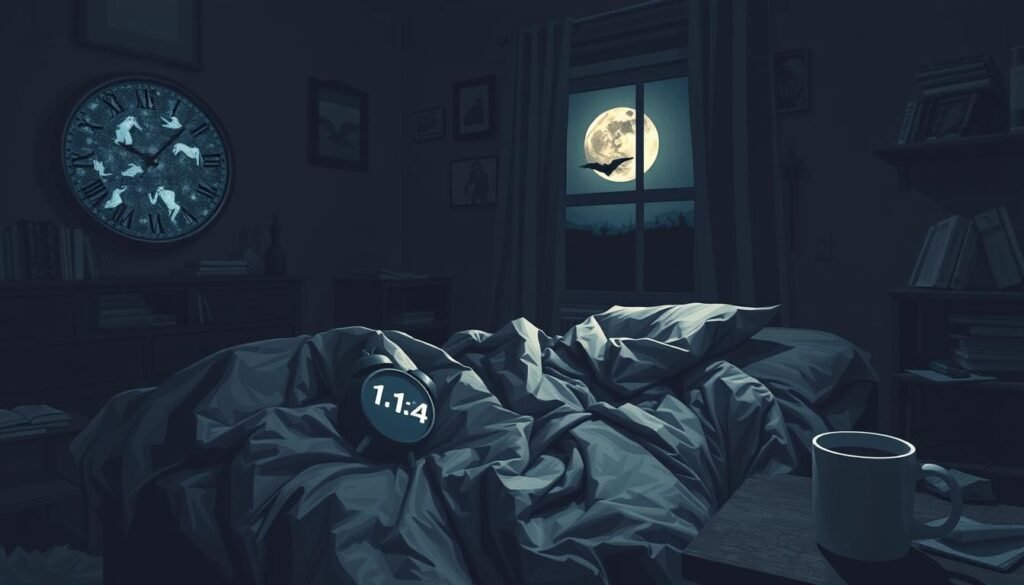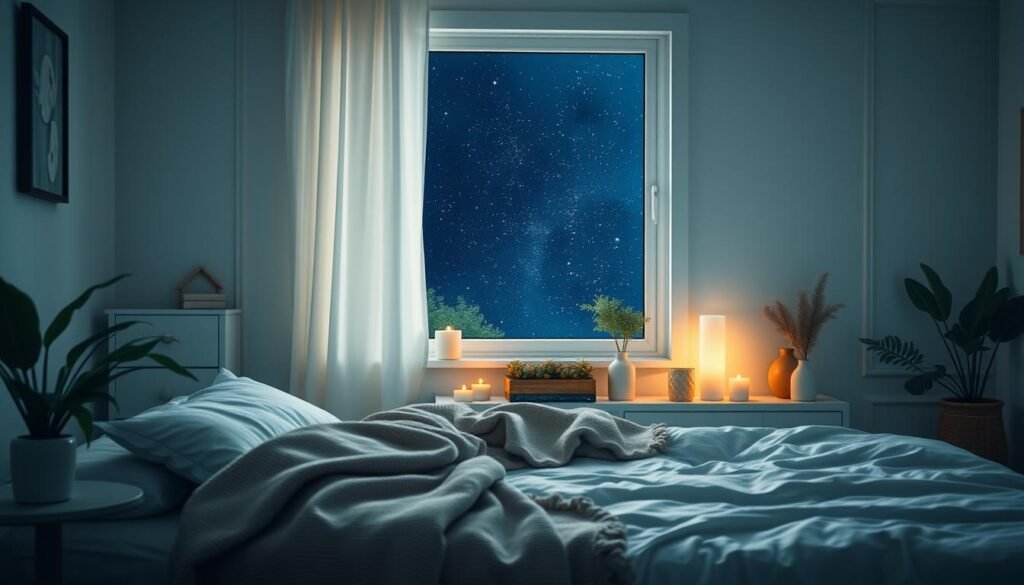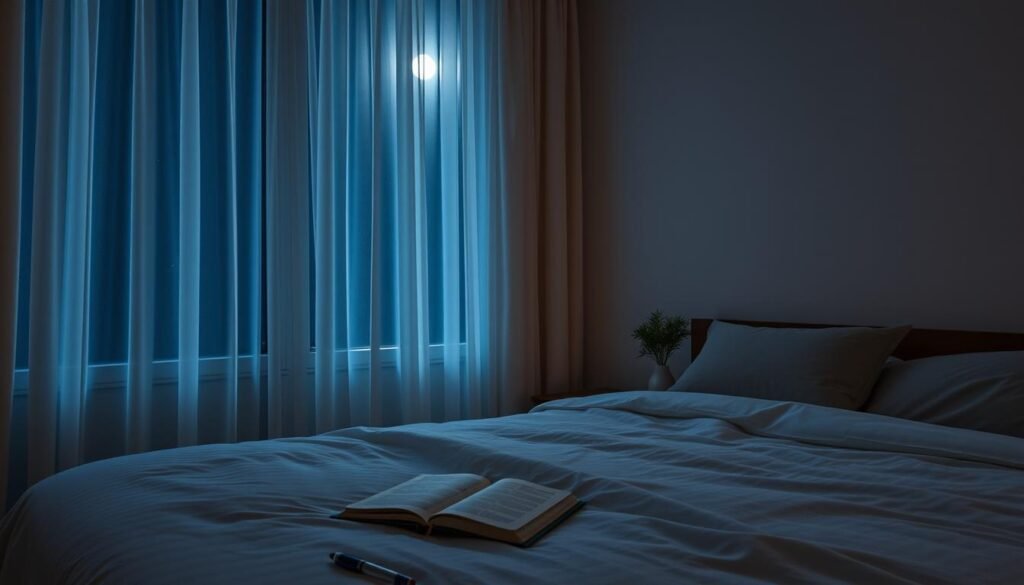Nearly 40 million adults in the U.S. face chronic sleep problems, many due to anxiety-induced insomnia. This big issue takes away peaceful nights and refreshing mornings from so many. Knowing how anxiety and sleep troubles connect is key for those wanting better sleep. Here, we’ll share tips and strategies for beating insomnia related to anxiety.
Key Takeaways
- Anxiety significantly impacts sleep quality for millions of Americans.
- Identifying the link between anxiety and sleep issues is crucial.
- Implementing effective strategies can help overcome insomnia.
- Natural remedies and therapies are available to support restful sleep.
- Maintaining proper sleep hygiene is essential for improvement.
Understanding the Insomnia-Anxiety Connection
The insomnia-anxiety connection shows how mental health and sleep problems are linked. When people get more anxious, they may find it hard to fall asleep or stay asleep. This relationship between anxiety and sleep creates a cycle. Poor sleep can make anxiety worse, which in turn leads to more sleep issues.
Research shows that anxiety can cause physical changes, like a faster heart rate and tense muscles. These changes make it hard to relax and sleep well. This makes the problem of anxiety affecting sleep quality even worse. Anxiety and sleep issues feed off each other. This is why it’s important to tackle both to feel better.
Understanding this connection can help people find ways to deal with both anxiety and insomnia. Knowing how anxiety impacts sleep can lead to effective solutions. These solutions can help break the cycle between bad sleep and anxiety.
Can Anxiety Cause Insomnia?
Many wonder if anxiety can lead to insomnia. Studies show a strong connection between anxiety and trouble sleeping. This affects many areas of life. Anxiety triggers the body’s fight-or-flight mode. This increases heart rate, muscle tension, and racing thoughts, making it hard to relax.
Studies on the brain reveal anxiety’s impact on sleep. Stress hormones rise, disturbing the sleep cycle. This makes falling and staying asleep challenging. This pattern means anxiety and lack of sleep make each other worse.
Knowing how anxiety affects sleep helps in finding solutions. Recognizing these issues allows people to manage their anxiety and sleep better. This understanding is key for those struggling with insomnia.
Common Anxiety-Induced Sleep Problems
Anxiety shows up in many ways, causing different sleep issues. Knowing about these can help identify sleep troubles related to anxiety. This link between sleep and anxiety affects our well-being deeply.
Types of Sleep Disruptions Linked to Anxiety
Anxiety often leads to various sleep problems, like:
- Difficulty falling asleep: Constant thoughts can make starting to sleep hard.
- Nocturnal awakenings: Waking up many times at night interrupts sleep.
- Early morning awakening: Rising too early makes one feel tired.
Symptoms of Anxiety-Related Insomnia
It’s key to know the symptoms of insomnia from anxiety. Some main signs include:
- Racing thoughts: Overwhelming thoughts block peaceful sleep.
- Physical tension: Anxiety tightens muscles, complicating relaxation.
- Pervasive restlessness: Feeling unable to settle disrupts sleep.
Effects of Anxiety on Sleep Quality
Anxiety greatly affects how well we sleep, making it an important issue for those with sleep problems. High anxiety can mess up disrupted sleep cycles, impacting our night’s rest. By learning about how anxiety and sleep quality are connected, we can better understand what people with insomnia go through.
How Anxiety Impacts Sleep Cycles
Studies show that anxiety deeply affects sleep stages, especially REM and non-REM cycles. This can make getting restful sleep hard, which is needed for good health. People with a lot of anxiety often face:
- Increased difficulty falling asleep
- Frequent awakenings during the night
- Less time in restful sleep stages
This situation harms not just anxiety and sleep quality, but also leads to daily tiredness and being easily upset. Getting a full night’s sleep is crucial because it helps us handle emotions and think clearly.
| Sleep Stage | Normal Functioning | Effects of Anxiety |
|---|---|---|
| REM Sleep | Helps with remembering and managing feelings. | Often interrupted, making emotions harder to control. |
| Non-REM Sleep | Allows the body to heal and restore itself. | Less time in this phase means more exhaustion and less effective functioning. |
More and more research is showing how complex the link is between effects of anxiety on sleep quality. Knowing about these connections can help people take steps towards improving mental health and sleep habits.

Identifying Triggers for Anxiety and Sleep Issues
Understanding what triggers your insomnia is key to managing anxiety. By finding out what influences your feelings and health, you gain insight. Reflecting on your daily life, where you are, and who you’re with highlights what makes your anxiety worse at night.
Seeing how anxiety ties to sleep problems helps uncover patterns to tackle. Stress from work, relationships, or personal goals can disturb your sleep. Recognizing these stress factors lets you find better ways to cope, improving how well you sleep.
- Environmental Factors: Noisy surroundings, uncomfortable sleeping conditions, or excessive lighting.
- Social Influences: Conflicts with friends, family, or coworkers that stay on one’s mind.
- Psychological Stress: Overthinking past experiences or anticipating future challenges.
Figuring out what leads to your insomnia matters a lot. Writing down your feelings, activities, and sleep habits in a diary helps. This commitment to understanding yourself improves your approach to anxiety and sleep.
| Type of Trigger | Description | Potential Impact |
|---|---|---|
| Environmental | Distractions from loud noises or bright lights | Increased difficulty falling asleep |
| Social | Unresolved conflicts or stressful interactions | Heightened anxiety before bed |
| Psychological | Ruminating thoughts about daily life | Insomnia and restless nights |
Effective Strategies to Treat Anxiety Related Insomnia
Finding relief from anxiety related insomnia starts with a good bedtime routine and mindfulness. Using strategies effectively can make nights more peaceful. And greatly lower anxiety levels. Techniques used can change nighttime from stressful to peaceful.
Creating a Relaxing Bedtime Routine
To manage anxiety-related insomnia, a calming bedtime routine is needed. This should have activities that tell your body it’s time to relax. Here are some tips for a calming evening:
- Engaging in quiet reading or listening to soothing music.
- Practicing deep breathing or gentle yoga stretches to release tension.
- Avoiding screens at least an hour before bed to minimize blue light exposure.
- Setting a consistent sleep schedule by going to bed and waking up at the same times daily.
Mindfulness and Meditation Techniques
Mindfulness is a strong method for managing anxiety and insomnia. Focusing on now can reduce thoughts that make sleep hard. Techniques include:
- Guided meditations or mindfulness apps that offer calming audio tracks.
- Practicing gratitude journaling to foster positive thinking before sleep.
- Employing visualization techniques to imagine a peaceful, serene environment.
Adding mindfulness and meditation to your routine can calm you. This can help you get a better night’s sleep.

Natural Remedies for Anxiety Induced Insomnia
Looking into natural remedies for insomnia offers new options for those who have trouble sleeping because of anxiety. Herbal supplements and aromatherapy are great for helping you relax and sleep better. They provide good ways to deal with anxiety-related sleep problems.
Herbal Supplements and Their Benefits
Herbal supplements are becoming popular for helping people sleep better. Here are two well-known ones:
- Valerian Root: This herb is known for making people feel calm and is used to fight anxiety and help with sleep. Studies show it can help you fall asleep faster, which is why many people turn to it.
- Chamomile: Often drunk as a tea, chamomile calms the nerves. It has antioxidants that improve sleep quality and help reduce insomnia symptoms, especially for those dealing with anxiety.
The Role of Aromatherapy in Sleep Quality
Aromatherapy uses scents to help with anxiety and improve sleep. Essential oils can make your surroundings calming, leading to better sleep. Here are some essential oils to try:
- Lavender: Known for its relaxing smell, lavender oil can reduce anxiety and help you sleep deeper.
- Bergamot: Its citrus scent uplifts while calming the mind, helping to make sleep better.
- Ylang Ylang: With its rich floral scent, ylang ylang lessens stress and creates a restful sleep environment.
Using these herbal supplements and aromatherapy can aid in managing anxiety and improving sleep. Embracing these methods offers a way forward in tackling insomnia.
Cognitive Behavioral Therapy for Insomnia (CBT-I)
Cognitive Behavioral Therapy for Insomnia (CBT-I) is a proven method to aid those with sleep problems. It is especially useful for people whose issues come from anxiety. Through changing negative thoughts and actions that hamper sleep, it helps enhance sleep quality.
Understanding CBT-I Techniques
CBT-I uses several main strategies to improve sleep management. These key techniques include:
- Cognitive restructuring: Identifying and confronting negative sleep thoughts to foster positivity.
- Sleep restriction: Reducing bed time to lessen wakefulness at night.
- Stimulus control: Making the bed a strong cue for sleep, easing sleep worries.
- Relaxation training: Teaching ways to calm both mind and body before bed.
How CBT Can Address Anxiety-Related Sleep Issues
CBT-I targets anxiety directly with therapy. It offers structured help to control anxiety, which aids sleep. By tackling anxiety and insomnia together, CBT-I provides a full solution for those facing these combined challenges.

| CBT Techniques | Focus Area | Benefits |
|---|---|---|
| Cognitive restructuring | Negative thought patterns | Improves mindset towards sleep |
| Sleep restriction | Time spent in bed | Enhances sleep consolidation |
| Stimulus control | Associating bed with sleep | Reduces sleep-related anxiety |
| Relaxation training | Mental and physical relaxation | Promotes restful sleep |
The Importance of Sleep Hygiene
Good sleep hygiene is key to fighting insomnia tied to anxiety. Adopting practices to boost sleep quality can make a big difference in well-being. A sleep-friendly environment means better rest and feeling more refreshed in the morning.
Best Practices for a Restful Sleep Environment
To get great sleep, certain steps help. They include:
- Minimizing noise by using sound machines or earplugs.
- Controlling light with blackout curtains or eye masks.
- Keeping a consistent temperature, ideally cool and comfortable.
- Maintaining a clean, clutter-free bedroom to promote relaxation.
- Investing in a comfortable mattress and pillows tailored to personal preferences.
Healthy Sleep Habits to Develop
Along with a good sleep setting, healthy habits are vital. Important habits are:
- Establishing a regular sleep schedule by going to bed and waking up at the same time daily.
- Avoiding caffeine and large meals close to bedtime.
- Engaging in calming pre-sleep activities like reading or taking a warm bath.
- Limiting screen time from smartphones, tablets, and computers before sleep.
- Incorporating physical activity into daily routines to promote natural fatigue.
Consulting a Professional for Anxiety and Insomnia
Knowing when to seek help is key for those with anxiety and insomnia. When your own efforts don’t cut it, a consultation for anxiety and insomnia might be what you need. Professionals can give you personalized advice and support to feel better.
When to Seek Therapy or Counseling
It’s vital to know when therapy is needed for anxiety and sleep problems. Look for these signs:
- Persistent difficulty sleeping despite trying self-help methods
- Intense anxiety that interferes with everyday life
- Noticeable shifts in mood or behavior
- Constant tiredness related to sleep troubles
At these times, professional help for sleep issues can offer ways to handle symptoms and sleep better.
Medication Options for Managing Anxiety and Insomnia
Sometimes, medicine is needed for anxiety and insomnia. There are various meds that can help, like:
- Antidepressants: These can tackle underlying anxiety issues.
- Benzodiazepines: Great for quick relief from severe anxiety.
- Sleep Aids: These are made to sort out sleep problems.
Talking to a healthcare professional is essential before taking any meds. This chat makes sure the medication for sleep disorders fits well with your health plan.
With expert advice, finding the right mix of treatment and medication for you becomes easier. This helps you on your journey to peaceful sleep.
Long-term Management of Anxiety Related Sleep Problems
Handling anxiety-related sleep issues means committing to long-term approaches. A routine that includes coping methods can improve sleep and well-being. Practices like relaxation techniques and calming activities before bed are helpful.
Lifestyle changes also play a key role in managing sleep problems. Better diet, regular exercise, and good sleep habits can greatly improve sleep. It’s important to reduce screen time at night, ensure a cozy sleep space, and stick to a sleep schedule.
Continuous therapy provides crucial support for chronic insomnia. Seeing a mental health professional regularly offers insights and personalized strategies.
Periodic check-ups are important to monitor progress, uncover issues, and tweak treatment plans. By staying committed, overcoming sleep disturbances linked to anxiety is achievable.
| Strategies for Management | Description |
|---|---|
| Consistent Routine | Establishing regular sleep and wake times to reinforce the body’s internal clock. |
| Lifestyle Adjustments | Incorporating regular exercise, balanced nutrition, and limited caffeine intake. |
| Relaxation Techniques | Practicing mindfulness, deep breathing exercises, or yoga to reduce anxiety before sleep. |
| Therapeutic Support | Engaging in ongoing therapy to develop effective coping strategies for anxiety. |
| Sleep Environment | Creating a dark, quiet, and comfortable bedroom conducive to restful sleep. |
Conclusion
Overcoming insomnia caused by anxiety needs a deep understanding. This article has shown how anxiety affects sleep. It talks about sleep issues that can happen.
To sleep better, try a calming bedtime routine and mindfulness. Consider natural remedies too. Recognizing healthy sleep habits is crucial.
Improving sleep habits and sleep hygiene can help manage anxiety. Seeking help from experts is also a good step. Doing this can lead to better sleep and health.
It’s vital to deal with anxiety and insomnia together. Taking steps now can lead to restful sleep and a happier future.